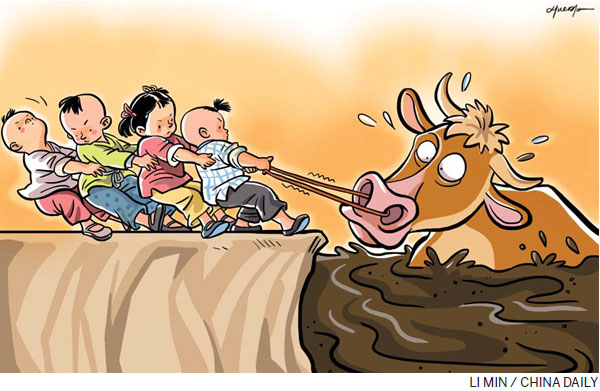Market disaster provides ultimate test
Updated: 2015-07-10 07:25
By Ed Zhang(China Daily Europe)
|
|||||||||||
The issue is not how government will stop the slide, but whether it remains committed to reform afterward
The roller coaster that the Chinese stock market has ridden in the last couple of weeks has been widely reported, including the evaporation of market value equivalent to 10 times the Greek GDP.
Indeed, had it not been for the financial power China has accumulated from more than three decades of reform and opening-up, the second-largest economy would have been in an equal - if not even worse - situation as the southern European country.

The Chinese government has taken a train of contingent moves to put the brakes on what some investors have called a stock market disaster. It should be enough to dissipate a panic that had once loomed large and bring the market to a more stable environment.
But the cost the country will pay will be heavy. And there are deep lessons to be learned before its capital markets can return to normal.
Lesson one: It is dangerous to play with greed, even if it is the people's greed. Human beings are greedy. So are the companies and institutions they form, whether or not they are state-owned, unless they are tasked to aim for something other than returns on investment.
At a time when the economy seemed to grow at a less than ideal pace, as it was in the beginning of the year, it would certainly be nice for many companies to be able to raise additional funds from a robust stock market to reinvest in their new products or services.

But it would certainly invite danger if the market was allowed to channel almost unlimited funds, some of which were on credit, to nearly all listed companies, whether or not they had a worthy reinvestment plan or adequate management to execute it.
At one time, the authorities were so lenient as to allow investors who had borrowed heavily to increase their bets in the market without a warning or precaution about any adverse consequences. Small wonder that the bull market from April to May - before the index began to go downhill in June - was nicknamed a "leveraged bull".
Naturally, when the general share price level goes up too fast and too high, the market will offer itself up as an easy target for short-sellers. The same greed can drive people with as much passion as they had about the leveraged bull market to slaughter that bull without mercy.
Lesson two: The stock market is by nature an untamed place. The government would be more likely to make a mistake by setting a target or seeking a goal of its preference. Nor can a stock market rally directly contribute to the overall growth of the economy, from the re-investment in industrial hardware to an increase in retail sales.
The bond market, by contrast, is a much easier way to lead the flow of society's funds where the central government would like to have it, such as large, national-level public infrastructure projects.
China is already a nation with a considerable number of people looking for a quick return on their money. Rather than letting those people invest their money in companies they hardly know anything about in the stock market, or buy houses in foreign cities where they can hardly live in, the government should put their resources to a better and more profitable use.
Lesson three: Don't blame reform for the stock market crash. Rather, it is a lack of reform that gave rise to the recent nosedive in indexes.
Yet the lack of reform comes from two things, like two sides of the same coin. One side is the lack of a truly centralized regulatory regime for the financial market and due protection of the key interests of small investors. The other side is a lack of a truly competitive market and diverse investment instruments.
There should be an overarching body, aided by people with lots of industry experience, to coordinate the separate bureaucracies overseeing different parts of the financial market.
It will take some time for China to pick up the pieces after its recent stock market rout. But it would be unfortunate if the disaster were allowed to interrupt the change that the leaders declared in the famous Third Plenum in 2013, such as by leading to a prolonged freeze on change.
For the government of a large country, the ultimate test of its power and intelligence is not whether it can stop any undesirable trend by forceful interference, but whether it can open up a new opportunity from the past chaos.
The author is editor-at-large of China Daily. Contact the writer at edzhang@chinadaily.com.cn.
(China Daily European Weekly 07/10/2015 page11)
Today's Top News
BRICS 'disappointed' by US failure to ratify IMF reform
BRICS summit condemns WWII 'misrepresentation'
SCO can play major role in Silk Road, Xi says
Stocks surge as government moves to save market
Doubts over heroes' authenticity grow with widening Internet access
Sun and sand is where the wealthy from Chinese mainland head
Chinese stocks plunge to three-month low
Macedonia expects first mutiple unit train from China
Hot Topics
Lunar probe , China growth forecasts, Emission rules get tougher, China seen through 'colored lens', International board,
Editor's Picks

|

|

|

|

|

|






